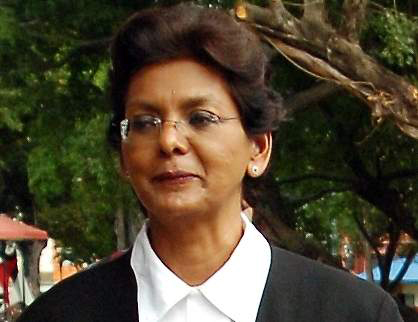(Trinidad Guardian) The Government has won its bid to appoint a pair of provisional liquidators for CL Financial (CLF).
Delivering an oral judgement at the Hall of Justice, Port-of-Spain, Tuesday evening, Appellate Judges Peter Rajkumar, Charmaine Pemberton and Andre Des Vignes reversed the decision of High Court Judge Kevin Ramcharan, who had rejected the Government’s application last week.

As part of its ruling, the court allowed the Government’s lawyers and those for a group of shareholders opposed to the move to wind up the company, to determine the remit of the liquidators.
The liquidators selected by the Government are Hugh Dickson and Marcus Wide of international accounting firm Grant Thornton.
In their discussions, head of the State’s legal team Deborah Peake, SC, explained that the provisional liquidators will have less power than traditional liquidators, as they were merely hired to assess the company’s assets and ensure they are not disposed of pending the determination of the petition to wind up the company.
If successful with the petition, which is also before Ramcharan, the Government will then be able to appoint traditional liquidators who would seek to sell the company’s assets in order to repay Government its remaining $15 billion debt and the debts owed to other creditors. Under the agreement, almost all of the decisions of the provisional liquidators will have to be approved by the court.
At the start of Tuesday’s hearing, the shareholders sought to withdraw their move to retake control of the company’s board, which was the catalyst for the Government’s action in making the winding up petition.
Their attorney, John Jeremie, SC, said his clients were willing to postpone the vote on appointing Carlton Reis and Kirk Carpenter as two additional board members, which was scheduled to take place at an extraordinary meeting of shareholders Tuesday afternoon.
Jeremie said: “There is no immediate or imminent threat of the composition of the board changing over the next three months, therefore there is no need for the court to grant the order for provisional liquidators to be appointed. The Government is and will remain in control until at least the end of October.”
In response, Peake said the reversal in position did not affect Government’s plan to recoup its debt, as the move by the shareholders to retake control of the board was not its sole concern in making its decision to have the company wound up.
“We did not rush to have the company wound up. We came to court when it became clear that the company does not have the assets to pay its debt,” Peake said.
In its decision, the Appeal Court agreed with Ramcharan’s assessment over the company’s insolvency, but said he made an error when determining the need for the provisional liquidators.
Rajkumar said Ramcharan was mistaken when he said the State had to prove the shareholders would dispose of assets if they had gone through with their plans. The Appeal Court instead agreed with Peake, who had claimed the company’s assets were being disposed of in its normal day-to-day operations because it was making continuous losses, including a deficit of $3.5 million in April.
“An insolvent company is not supposed to be trading. This company is not temporarily insolvent, this company is chronically insolvent. Since 2009 the Government has been in rescue mode to see what can be done to recover the debt without liquidation, but there comes a time when enough is enough,” Peake said.
Catastrophic
In their submissions, Jeremie and Lynette Maharaj, SC, said their clients were concerned about the appointment of the liquidators as it would be catastrophic for the company.
“I understand that the Government has a concern how its debt is to be repaid. These shareholders want to repay the Government but they are not getting the co-operation of the Government. Once you put the liquidators in it is going to be counter-effective at the end of the day,” Maharaj said.
She also questioned the timing of the Govern-ment’s move, as she said it had been in effective control of the company over the past eight years.
The winding up petition came up for hearing before Ramcharan minutes before the appeal was due to commence Tuesday morning.
In a brief hearing before Ramcharan, the shareholders’ lawyers indicated that they had filed their application to represent the company in the petition. Ramcharan adjourned the hearing until this morning.
Ravi Heffes-Doon is also representing the Government, while Maharaj’s husband, Ramesh Lawrence Maharaj, SC, is appearing alongside her and Jeremie for the shareholders, who together hold over 60 per cent stake in the company.
The Government made the application and a corresponding winding up petition for the company earlier this month, after the shareholders signalled their intention to change the composition of the board, which was government-controlled since Clico’s bailout.
As a condition of the bailout, CLF, in its shareholder’s agreement with the government, had agreed to honour its subsidiary’s debt and allow government to select four members, including the chairman, to its seven-member board. The agreement, which was renewed 17 times since being first signed, expired in August last year and the shareholders refused to agree to a new deal.
The shareholders’ refusal was reportedly based on the failure of the Ministry of Finance to consider a proposal from independent auditing firm PricewaterhouseCoopers (PwC), which suggested that they be given control of the company and allowed to renegotiate the repayment arrangement for the $15 billion still owed to the Government.
They are claiming that the company’s debt to the Government is inflated and the company is not insolvent, as is required for winding up proceedings.
While the shareholders on Tuesday agreed to postpone their bid to take over the company’s board to October, it may now be rendered unnecessary as the company and its board would cease to exist once the liquidation process is initiated in the event that the winding up petition before Ramcharan is successful.





